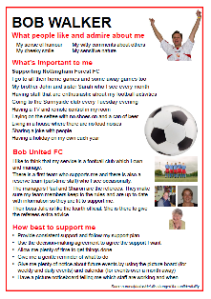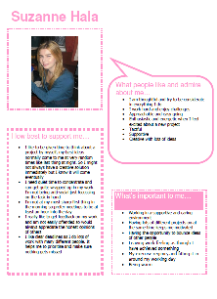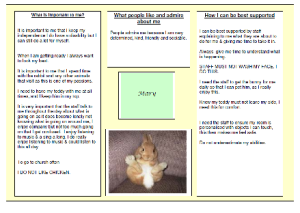Written by Sarah Carr, independent Mental Health and Social Care knowledge Consultant www.sarahcarrassocs.co.uk
When I wrote my one-page profile I was thinking specifically about mental health and prevention. I reflected on what helps and hinders me and what makes me feel safe. I think my profile is a very effective tool for self-management – sometimes I lose sight of what can affect me! Because I had complete control over what is in the profile, I represented myself in a way that is true to me – I didn’t have to use a diagnosis, explain my history or fit into a category. I communicated who I am and what I need without having to label myself. In this way profiles can help with overcoming the stigma associated with psychiatric diagnosis and can challenge self-stigma. Like many people with mental health problems, I have a negative view of myself and fairly low self-worth. Here, I was especially challenged by the part where I had to think about what people appreciate and value in me, my gifts and my strengths. Although it was a hard exercise, for me it was a form of therapy. Finding good things about yourself and committing them to writing as part of a profile to be shared so you can be understood fully can be a powerful exercise for someone with low self-worth or internalised stigma. At the moment I’m using my profile to remain aware of what keeps me safe and well (and to remind me of what people value in me!) but if I should experience a crisis again I would use the profile to communicate with mental health practitioners and as a way to aid my recovery – that is recovering my life and self.
As an independent mental health and social care knowledge consultant, my lived experience of mental distress and service-use informs my work. I really wanted to join the conversation about one-page profiles on this blog site because I believe they have the potential to address many of the difficulties that people who experience mental distress or use mental health services often encounter.
One-page profiles in a mental health crisis
If someone is using mental health services a one-page profile can be a powerful way to communicate and maintain their personhood in what can often be a dehumanising, medicalised system. For someone who finds themselves in crisis and is admitted into hospital, a profile can be a very effective way of communicating who they are and what good support looks like at a time when they might not have the capacity or opportunity to do so in any other way. Many people who have been patients in psychiatric hospitals say that they felt reduced to their symptoms or diagnosis and weren’t understood as whole people with interests, strengths, talents and preferences. We now know how detrimental this can be and clinical guidelines are in place to emphasise the person-centred, human elements of mental health support such as empathy, optimism, dignity, respect, support for self-management, emotional support, being known and having appropriate activities. A one-page profile, written by the person when they feel well, with support if needed, can be an effective way to support continuity of understanding about an individual in changing circumstances and fluctuating mental health. They could be used alongside more formal Advance Directives, which are designed so the individual gets a say over treatment and other practical decisions should they become too unwell to make decisions themselves.
In the workplace
Many workers and workplaces struggle with understanding how to recognise and address the stress that can lead to new mental health problems or a relapse of existing ones. Employers may find workplace accessibility and reasonable adjustments difficult to understand for mental health. Stigma continues to be very a difficult issue for people with mental health problems who are job seeking or in employment. But as in mental health services, the solutions are often rooted in simple things like communication and being understood as an individual. Both these aspects are addressed in a one-page profile which could help facilitate a person with a mental health problem to self-manage at work and help their manager or colleagues to be supportive in practical ways. If an individual is having problems with workplace stress or is recovering from an episode of mental distress, the ‘how to support me’ part of the one-page profile can help with implementing reasonable adjustments and ensuring accessibility. Mental health stigma can be reduced and crisis prevention promoted in the workplace if every employee has a one-page profile, designed to communicate individual strengths, preferences and needs to line managers and HR personnel.
To summarise, I think that if used well, in mental health services profiles could significantly improve the experience of users and if applied in the workplace, this simple approach could make it a much safer and more accessible place. In both cases, it’s about being known as a person and being able to communicate what’s important to you, which can help with prevention and self-management as well as getting through a crisis period.





